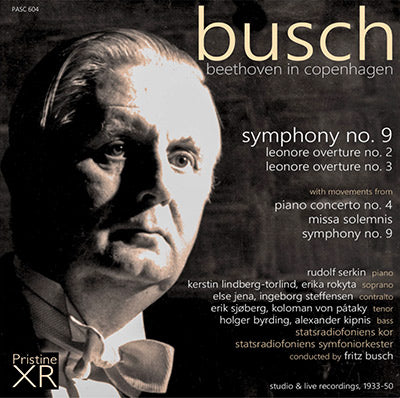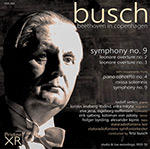
This album is included in the following sets:
This set contains the following albums:
- Producer's Note
- Full Track Listing
- Cover Art
Ever since his debut in Copenhagen in the early 1920s, Fritz Busch was a well-loved visitor to the Danish capital (he settled in Denmark in 1934). And although his frequent performances well into his year of death 1951 were broadcast, only a fairly limited number of them have survived on record. Busch’s few surviving Copenhagen recordings of music by Beethoven may easily be divided into live recordings from 1948/1950, presenting complete performances of the Ninth Symphony and the overtures Leonore II and III, and single movements from works recorded in the years 1933-5. Yet these earlier fragments contain works otherwise not documented by Busch, i.e. the Missa solemnis and the Fourth Piano Concerto, the latter here heard with the soloist Rudolf Serkin, the son-in-law of Busch’s brother Adolf. This performance, as some more concerts in Copenhagen conducted by Busch, took place but a few weeks before the conductor was being discharged from his Dresden post by the Nazis.
Busch’s choice of vocal soloists in choral orchestral works performed in the Odd Fellow Palæets store Hall, was both linked to Copenhagen Royal Opera, and to performers Busch held in high esteem from his Dresden days. Both Koloman von Pátaky, who returned to his native Hungary in 1938, and Alexander Kipnis, who emigrated in 1935, were guest performers at Glyndebourne in 1936’s Zauberflöte and were frequently heard in both Busch’s and Erich Kleiber’s seasons at Buenos Aires in the 1930s. Vienna-based soprano Erika Rokyta was a well-known concert singer on the European continent and made frequent guest appearances in Denmark and Sweden. Swedish concert soprano Kerstin Lindberg-Torlind was most successful both in Scandinavia and Germany, being appointed a Royal kammersanger in 1950, while operatic mezzo-soprano Ingeborg Steffensen, a kammarsanger from 1931, and concert-singer Else Jena concentrated their careers mostly on their native Denmark. Erik Sjøberg, who premiered Britten’s Peter Grimes in Copenhagen in 1947 and who was appointed a kammersanger in 1951, was a tenor highly esteemed by Birgit Nilsson. Holger Byrding, who had been Sjøberg’s teacher and whose repertoire covered all important bass-baritone roles but who was an acknowledged heldenbariton, had been a kammersanger from 1934.
Jürgen Schaarwächter
BuschBrothersArchive in the Max-Reger-Institut, Karlsruhe
Disc One
Erik Sjøberg, tenor; Holger Byrding, bass;
Radio-Koret (dir. Svend S. Schultz)

